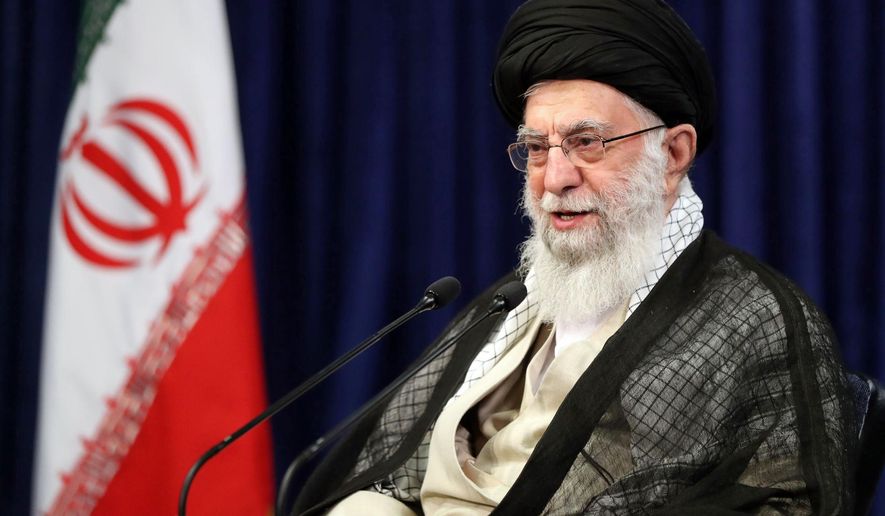Top Iranian officials fumed as President Trump presided over the signing of a major Israel-Arab diplomatic deal at the White House on Tuesday, reflecting the widespread belief that Tehran ultimately may be the biggest loser of the historic breakthrough.
While Palestinian leaders have been equally furious in their denunciations, Iran’s blistering criticism of the agreement between Israel, the United Arab Emirates and Bahrain suggests that the Islamic republic faces a real loss of power and leverage in the Middle East as traditional anti-Israel sentiment thaws. Iran views Israel as a mortal enemy and its leaders have routinely called for the destruction of the Jewish state.
But a thawing of Israeli-Arab relations has a more worrying aspect for Iran — that the Arab nations’ fear of Tehran and its regional allies is even greater than the traditional hostility toward Israel, and that it will soon be Iran, not Israel, that is diplomatically isolated and outnumbered in the Middle East.
The landmark “Abraham Accords” signed Tuesday normalizes diplomatic relations between Israel and the UAE and Bahrain, the first such accord between Israel and an Arab state in nearly three decades. Mr. Trump predicted that the agreement will pave the way for other Arab states to finally normalize ties with Israel and perhaps even bring the Palestinians to the bargaining table.
But Iranian leaders cast the deal much differently, arguing that Trump administration officials privately strong-armed the UAE and Bahrain, and that the president is relying on Tuesday’s high-profile ceremony to give him a political boost heading into the November election.
Mr. Trump “desperately needed a campaign photo. His son-in-law blackmailed their regional clients into giving him one,” Iranian Foreign Minister Javad Zarif tweeted, alluding the role president adviser Jared Kushner played in the Israeli-UAE talks.
Other Iranian officials were even harsher in their critiques. Government spokesman Ali Rabiei said that the decision to do business with the “child-killing regime of Israel” could lead to regional instability and violence, according to the state-run Islamic Republic News Agency.
The same fury was evident in the reaction of Lebanon’s Shiite Hezbollah movement, which is one of Iran’s most potent proxies in the region.
The normalization deals amount to “a betrayal of Palestine and Jerusalem al-Quds,” Sheikh Naim Qassem, deputy head of Hezbollah, told a conference in the Iranian city of Qom on Tuesday.
“Normalizing only serves the interests of Israel and has no benefit for Palestine and the Palestinian cause,” he said, predicting the agreements will prove “a trump card in the hands of the Zionist regime to exert more pressure on the Palestinians in order to deprive them of their rights.”
Bolstering Israel’s arsenal
For its part, Israel tried to use Tuesday’s meeting to bolster its own defenses and deepen its security ties with the U.S. Israeli Prime Minister Benjamin Netanyahu reportedly asked Mr. Trump for another squadron of F-35s and other American aircraft. Mr. Trump previously has said he is open to such a weapons deal.
The UAE also is seeking to buy F-35s from the U.S., a move Israel opposes. Mr. Trump has vowed to work out a compromise.
Meanwhile, Palestinians held demonstrations Tuesday in the West Bank and in Gaza, burning photos of Mr. Trump, Mr. Netanyahu and the leaders of Bahrain and the UAE. A poll released Tuesday by the Palestinian Center for Policy and Survey Research found that 86% of Palestinians believe the deals serve Israel’s interest and not their own.
Such anger and skepticism may be justified. Some regional specialists say that while Iran is the most vocal and powerful critic, the Palestinians could lose the most, as much of their leverage in any peace negotiation with Jerusalem hinges on a united anti-Israel front in the Arab world.
“Arguably the Iranians will feel more surrounded when their adversaries are cooperating more closely, but in point of fact, the Emiratis were not about to start a war with Iran before, and they are not about to now,” Jon B. Alterman, director of the Middle East Program at the Center for Strategic and International Studies, wrote in an analysis Tuesday. “The biggest losers are probably the Palestinians. They saw their own weak negotiating hand with Israel and were counting on Arab solidarity to strengthen it.”
From America’s perspective, Tuesday’s deal is beneficial on multiple fronts. The administration is betting a deal between Israel and the Palestinians is more likely if regional tensions begin to cool and diplomatic ties are established.
Officials also have made no secret of the fact that they seek to isolate Iran.
“We laid out a vision for peace that had another element, that was the deep recognition that the primary destabilizing force in the Middle East was not the conflict between Israel and the Palestinians, but was rather the threat posed by the extraterritorial ambitions of the clerical regime in Iran,” Secretary of State Mike Pompeo said Tuesday at a virtual event hosted by the Atlantic Council.
The harsh reaction from Tehran and anti-Israel rhetoric, he said, shows Iran’s true colors.
“It has frankly shown the true anti-Semitic nature of the regime in Iran,” Mr. Pompeo said.
Amid the historic diplomacy, the U.S. Air Force joined with the Royal Saudi Air Force this week for Exercise Desert Eagle. The drills have no direct connection to the diplomatic deal, but American military cooperation with Saudi Arabia also serves as a warning to Iran, which is Riyadh’s chief regional foe.
“It was inspiring to see airmen from both our nations integrating so effectively on the ground and in the air,” said Brig. Gen. Evan Pettus, commander of the Air Force’s 378th Air Expeditionary Wing.
• Ben Wolfgang can be reached at bwolfgang@washingtontimes.com.




Please read our comment policy before commenting.